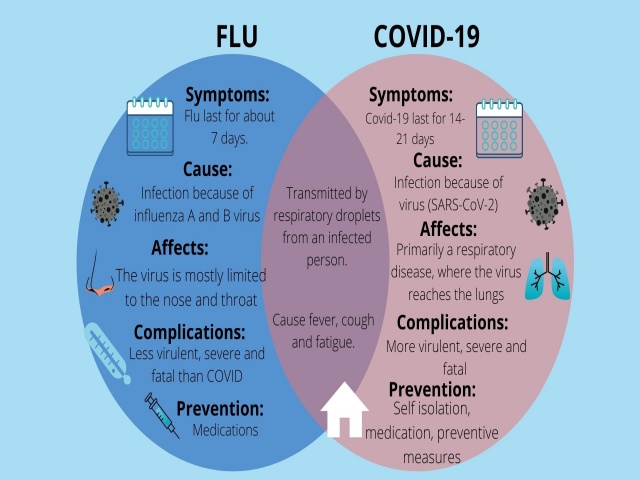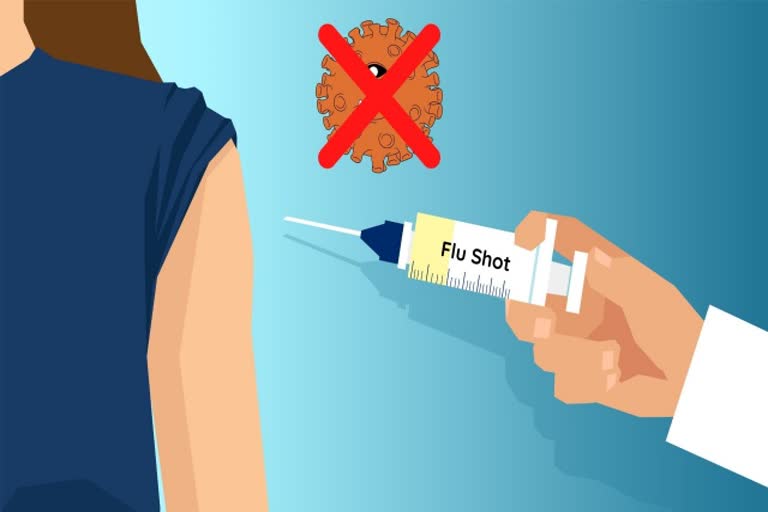Certain media reports have shown that there has been a rise in the flu shot this year, amidst the existing fear of contracting the novel coronavirus. The hype about the flu vaccine in the market is because people are under the wrong impression that the flu vaccine can act as a shield against COVID-19. But what people need to understand is that flu and COVID-19 are caused by two different viruses and therefore, their vaccines are completely different from each other. To understand more about the same, we talked to Dr. Sanjay K. Jain, MBBS, MD (Medicine), working with Apple Hospital, Indore
Basic Difference Between Flu And COVID-19

- COVID-19 infection happens due to the SARS-CoV-2 virus, while the flu spreads due to the influenza A and B virus.
- COVID-19 is primarily a respiratory disease, where the virus reaches the lungs, whereas, in the flu, the virus is mostly limited to the nose and throat.
- COVID-19 virus can be contagious for up to 14-21 days, while the flu virus can remain for about 7 days
- COVID-19 is more virulent, severe, and fatal than the normal flu
Can Flu Vaccine Act As COVID-19 Shield?
No, the flu vaccine cannot act as a shield against the novel coronavirus. The reason as Dr. Sanjay explains that every virus has its own different structure and when a vaccine is made for a particular virus, it can prevent a person from that virus only. In other words, vaccination available for flu or swine flu will prevent a person from getting infected from that particular virus only and won’t be effective on any other distinct virus.
What Is A Vaccine?
The process of making a vaccine is more or less similar for every virus. The Centers for Disease Control and Prevention (CDC) explain that vaccines contain the same germs that cause disease. (For example, the measles vaccine contains the measles virus, and the Hib vaccine contains Hib bacteria.) But they have been either killed or weakened to the point that they don’t make you sick. Some vaccines contain only a part of the disease germ.
Further, our expert explains that vaccines are injected in our body subcutaneously, i.e. under the skin. Once injected, vaccines stimulate our immune system, and antibodies are produced in order to fight against the disease-causing virus. Antibody production takes 2-4 weeks, after which you attain immunity against that particular disease. However, the duration for which the immunity may last can vary. In some vaccines, the immunity may last for a year or two, and so on. For example, the immunity of the swine flu vaccine lasts for a year, but till now we don’t really know any such details regarding the COVID-19 vaccine.
Since the vaccines are made using the most Live Attenuated Vaccines, i.e. made using the weakened germs, it can cause pain at the sight of injection or little flu-like symptoms such as mild fever, mild headache or body pain for a day or two, which can be treated with simple paracetamol. In extremely rare cases, there can be adverse reactions to the vaccine as well. But the percentage of such cases occurring are very minor. If a person’s body is already immunocompromised, then a person may have a neurological problem like meningitis, neuropathy or myopathy, etc. but it is a very rare complication of a vaccine.
Who requires The Flu Vaccine?
Dr. Sanjay says that as much as I have seen, people are not much bothered about getting themselves vaccinated against the flu. Although it is recommended for all, people don’t bother to get themselves vaccinated, probably due to lack of awareness. “Even if not for all, I thoroughly advise people who are at high risk, to get themselves vaccinated against the flu virus. Elderly people, patients suffering from certain chronic diseases like diabetes, heart disease, people who have had by-pass surgery, knee transplant patients, dialysis patients, cancer patients undergoing chemotherapy, bedridden patients, etc. are at a very high risk of developing pneumonia and flu. Therefore, flu vaccination is highly advised for them”. Apart from this, from kids to adults, the flu vaccine is recommended for all. We must try to raise awareness about its existence in the market since it is good for the community. It immunizes for a year or two.
Therefore, vaccines work only for a particular virus, for which it is made. Dr. Sanjay also informs that vaccine development usually takes 3-5 years. But now with the help of modern technology and medical advancements, vaccines for the COVID-19 virus have been developed in a very short period.



